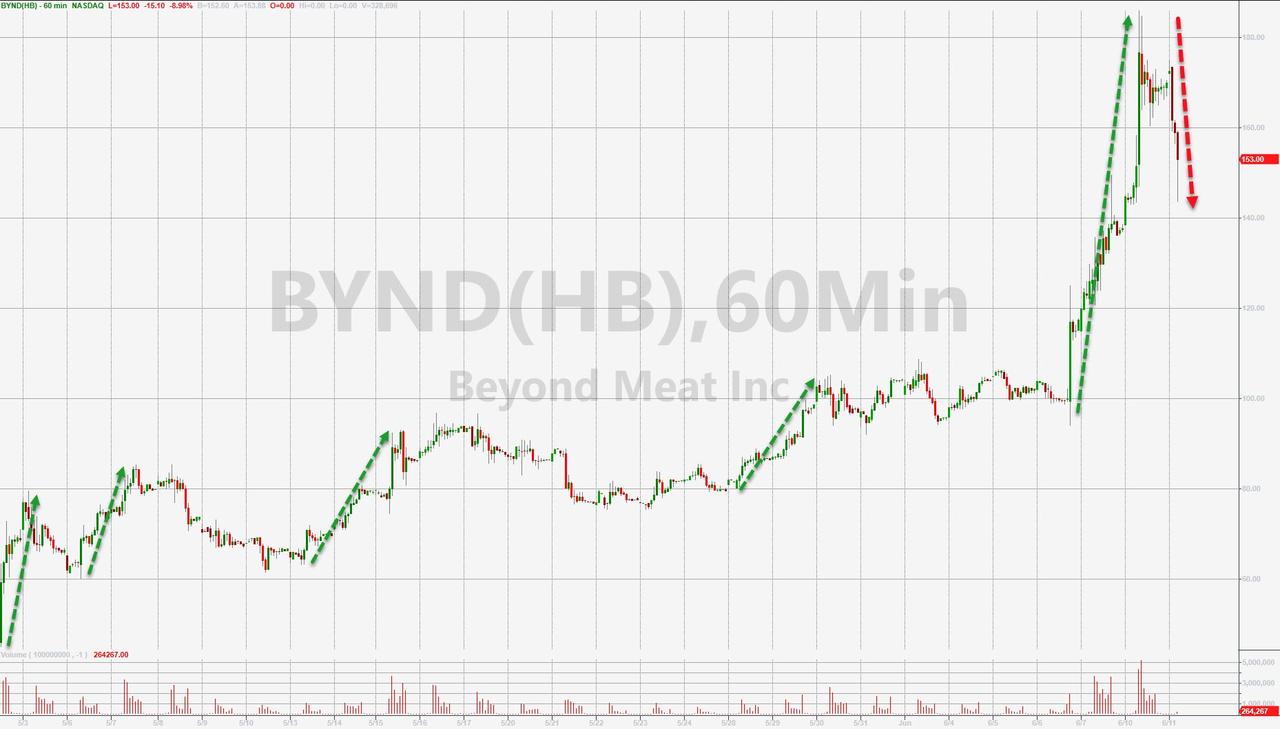First there was bitcoin (2017), then bud (Tilray & the other hot pot stocks that went parabolic late last year) – and now, $BYND (2019). Shares of the fake meat company have maintained the forward momentum from the day of the company’s IPO (where they rallied 150%) and have continued to climb, even as the broader market endured one of its most tumultuous stretches in recent memory (the Dow logged one of its longest losing streaks in 8 years last month).
But in a sign that the tide of frothy enthusiasm for the company might finally be turning, analysts at JP Morgan late Monday downgraded the company’s shares from “overweight” to “neutral” – becoming the first team of analysts at a top American investment bank to do so – just two sessions after the bank raised its price target from $97 to $120.
So what has changed? Well, fundamentally speaking, not much. But over the past two sessions, $BYND’s shares have climbed 70%, which has amazed even the most bullish of $BYND evangelists, after the company reported sufficiently robust earnings.
JPM’s cut appears to have impacted shares in the company’s stock, with shares tumbling 14% in premarket (though we imagine another product announcement will be forthcoming to turn things around).
Though JPM’s team remains extremely bullish on $BYND’s long-term growth prospects, justifying its present valuation would require alterations to JPM’s discounted cash flow model – namely, higher long-term revenue and gross margin growth projections – that the bank’s team isn’t yet comfortable making.
$168/share requires assumptions we are not yet comfortable with. For example, keeping all else equal, we could get our DCF to $168 if we assumed revenue growth rate decelerated to 35% in 2021 and then did not decelerate again until 2029. Or put more simply, we could get to $168 if we modeled $4.9B in 2029 sales, rather than the $3.5B we currently presume. Is $5B in sales in ten years out of the question? No but it’s not likely, either, in our view. Similarly, we could model the 2029 gross margin increasing to 43.3% versus the 35.5% we expect; this, too would lead to $168. But the food group’s median is only 29% – we think a ~1,500 basis point advantage is too extreme. Lastly, if we wanted to get $168 fair value, we could either lower the discount rate in our DCF to 2.5% from 6.2% or use a ~26x multiple for terminal cash flow. We could not rationalize a 2.5% discount rate in any way. 26x theoretically is justifiable – plenty of high-growth food and beverage companies trade over 20x today – but would we be okay applying 26x on all future cash flow after 2029? Not at this point.
Instead, the team believes that $BYND’s “extraordinary revenue and profit potential” has finally been priced in, and that the company’s shares will remain extremely vulnerable to any piece of disappointing news.
As we wrote last week, “At some point, the extraordinary revenue and profit potential embedded in BYND… will be priced in” – we think this day has arrived. Our above-the-Street estimates remain unchanged and our price target is more-or-less the same (up $1 merely to reflect lower rates – we value BYND via a DCF). In other words, this downgrade is purely a valuation call.
Although the country’s largest investment bank – and one of the lead underwriters of $BYND’s IPO – has come out as a bear, there’s plenty of reason to suspect that the rally in the fake-meat company’s shares might still have some room to run. In a report published yesterday, S3 Partners, argued that $BYND shares have hit what it called “the short-squeeze trifecta”: Lending fees on $BYND shares have continued to skyrocket (they hit 134% during Monday’s session), making it the most expensive major stock to short.
Overall, short interest stands at $814 million, or 5.87 million shares shorted, representing more than 50% of Beyond Meat’s float. The company is the sixth-largest short bet in the domestic packaged foods and meat sector. Those bears who have had the courage of their conviction to hold their positions even as $BYND shares have rallied 570% since the company’s IPO are down nearly $600 million. But after the company’s rally shifted into ‘ludicrous speed’ over the past two trading sessions, those margin calls might be coming.
“Beyond Meat has hit the short-squeeze trifecta, with several hundred thousand shares of recalls hitting the street; stock borrow rates solidly in the triple digits and its stock price rallying 69% in just two days,” said Ihor Dusaniwsky, managing director at S3.
In other words, Monday morning’s JPM-inspired hit might be more of a hiccup than an inflection point. But as a gentle reminder to all of those who don’t see any bubbles in the broader economy.
BEYOND MEAT SHARES EXTEND LOSSES TO 14% AFTER DOWNGRADE.
BYND:
Wednesday: $100
Thursday: $123
Friday: $148
Monday: $168
Tuesday: $150cc: all those who see no bubbles anywhere including @federalreserve; @neelkashkari
— zerohedge (@zerohedge) June 11, 2019
via ZeroHedge News http://bit.ly/2IxusOh Tyler Durden
